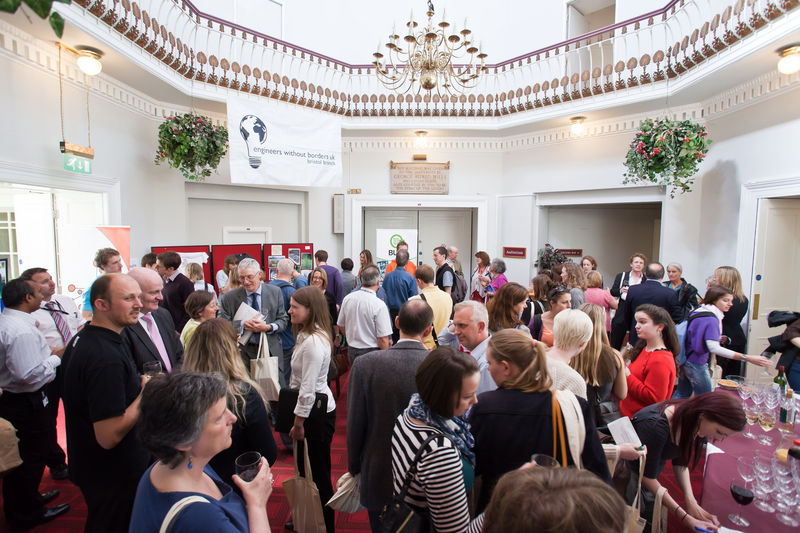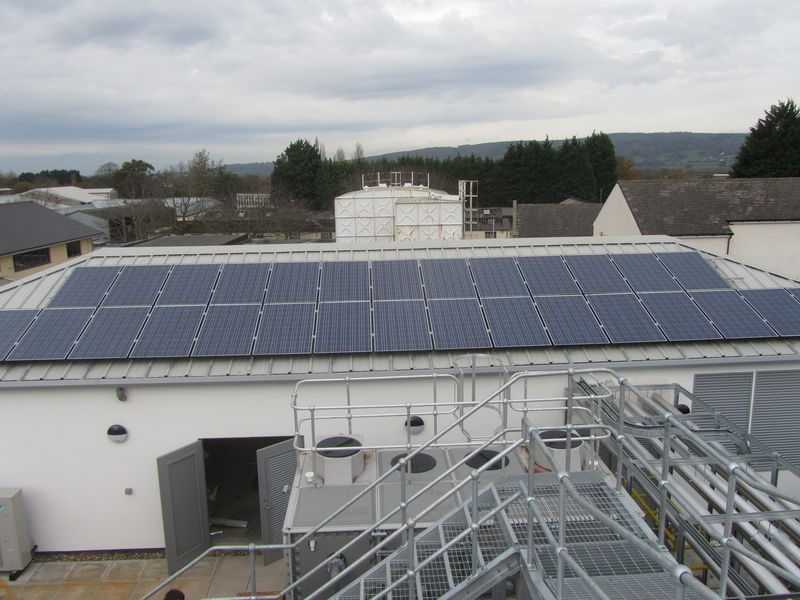University of Bristol
The University of Bristol is a research intensive university, based primarily in Bristol city centre, but with facilities across the city as well as in rural Somerset. It has over 300 buildings, with a high percentage of listed and conservation grade buildings.
The University has a big environmental impact in the sector: emitting 45k tonnes of CO2; generating almost 2,000 tonnes of waste; using over 400k cubic metres of water; and having just over 5,000 staff and 15,000 students travelling to and from the University.
It has had some success in reducing its environmental impact over the last ten years, but over the last three has really started to tackle whole-institution impacts.
Environmental Management System
The University of Bristol achieved ISO14001 certification and ACORN Phase 6 in April 2011 for the whole institution, excluding curriculum. In March 2012, it aims to add Curriculum. They have also achieved CEMARS (ISO14064-1:2006) energy efficiency certification for reduced emissions.
Carbon Management
The University has a £20million carbon management plan, of which it has spent £1.5 million on measures like voltage optimization, insulation, LED lighting and electronic movement sensor TRV’s. The University has seen a 4% reduction in emissions against its target, with a backdrop of growth in estate and expanding energy-intensive research. The University has also generated its first electricity from PV in the last year, with 165kW of panels on various buildings.
Water Management
The upgrading of its infrastructure as well as replacement of direct-to-drain cooling systems and awareness raising programme has led to a 9% reduction in water use.
Transport
A new university bus running from halls of residences to the main campus has been introduced, leading to 60,000 passenger journeys a month. The University also has a successful car club scheme for students and its staff car sharing scheme has seen a 25% growth over the last year. Currently, only 21% of staff travel to work by car on their own. It has also developed a Bicycle Surgery run jointly by the Student’s Bristol University Sustainability Team (BUST) and Sustainability Estates – over 500 bikes have been serviced.
Academic and Business Travel
The University of Bristol is currently running a JISC-funded project to look at academic travel, understanding the reasons for this travel, carbon foot printing it, embedding its monitoring within the institution and investigating the best interventions to reduce the need for travel. Results are due later in the summer 2012.
Waste Management
56% of all waste produced is diverted from landfill, 65% of office waste is recycled, including paper, cans, plastics, glass, cardboard, confidential waste, toner cartridges, metal, fluorescent tubes, batteries and WEEE. The University now reuses 7 tonnes of furniture and other consumables, including initiatives in the halls (the ‘Big Give’ which involves local charities). It composts 78 tonnes of food waste, including running it's own rocket composters, reducing carbon emissions from waste by 28%. The University are also reducing lab waste with the introduction of Polystyrene, Pyrex and lab plastic recycling.
Procurement
A new sustainable procurement policy, including initial actions on printer removal (to MFD’s) and a furniture tender that includes refurbishment of existing furniture at a third of the price of buying new. The University also has ‘Re:store’, a furniture exchange web site.
Green Buildings
The University has had a policy of achieving BREEAM excellent on new builds and very good on refurbishments, and to date has achieved three very good ratings and two excellent ratings on refurb’s and five excellent ratings on new builds. Features included are LED lighting, low velocity fume cupboards, four green roofs and a Combined Heat and Power (CHP) unit. The refurbishment of a halls of residence has seen a 30% reduction in gas use. The University has also signed up to the Government initiative ‘Halving construction waste to landfill by 2012’; work to date shows over 80% diversion from landfill for completed projects.
Biodiversity
External Estates continues to manage University woodland, grassland, wild flower meadows and historic gardens with the aim of increasing native habitats and species. Key focus has been on planting that increases invertebrate life.
Engagement
The University of Bristol developed Green Impact with the National Union of Students Services Ltd (NUSSL) in 2008. It has run a successful scheme since, engaging with over 70 departments, with an average of 40 departments taking part each year. This means over 1,500 environmental actions are taken each year. Almost 50 other universities now take part in the scheme.
Partnerships
Like most universities, the University of Bristol has many partnerships. These include joint working with NUSSL on the continued development of Green Impact, and with the Student HUB network to deliver a range of training and engagement activities (such as a social enterprise “Dragon’s Den”-style competition) with student groups.
Training
The Sustainability Department has become an accredited training centre for the Chartered Institute of Wastes Management, the professional body for waste management specialists, with over 100 staff members trained on better waste management and 90 students trained to carry out carbon, waste and green impact audits. Training and auditing for students is now linked with University initiatives relating to employability via the University’s Bristol PLuS scheme for accrediting voluntary activities of students - www.bris.ac.uk/careers/plusaward/index.asp
Curriculum
The University of Bristol has done some work on Education for Sustainable Development (ESD), in particular the Green Gown Awards winning open unit on sustainable development, which is open to all students, (www.bris.ac.uk/esu/unitprogcat/UnitDetails.jsa?unitCode=UNIV10001). However, taking part in the Higher Education Academy’s ‘Green Academy’ has acted as a catalyst to really look at ESD.
Supported by the Pro-Vice Chancellor for Education, the University has developed an approach that brings together Teaching, Research, Estates and the Informal Curriculum. It provides one to one assistance for departments regarding inclusion of sustainability in their subject area, uploading resources for academics onto the blackboard system and giving close support with two part time ESD posts. The Faculty Quality Enhancement Teams are now including ESD in their quality visits and monitoring reports. ESD is also included in the University’s new teacher induction and is offered formally to existing staff.
What next?
ISO 14001 - Expanding the EMS to include curriculum (audit in March – fingers crossed!).
Carbon Management – Optimising the three CHP units, changing fume cupboard operation, continued refurbishment of halls of residence, a £4.5 million reboilering and pump management programme and a £1.5million ‘energy makeover’ of the medical school.
Waste – Implementing further recycling and reuse schemes, and aiming to get as close as possible to zero waste to landfill in the next 12 months.
Curriculum – Rolling out ESD support for departments, full mapping baseline exercise, first monitoring results.
Procurement - Building on the existing policy to achieve the flexible framework level 3.
Engagement – Developing more effective behaviour campaigns. Deliver Green Impact Excellence scheme, as well as rolling the Green Impact labs and supporting Green Impact Hospitals for local trusts.
Transport – Creating of a transport hub at the halls of residence and joint working with the four regional local authorities and the University of West of England in delivery of the local sustainable transport fund.
Main Contact: Martin Wiles, Head of Sustainability
Main Contact Email & Telephone: m.r.wiles@bristol.ac.uk and 0117 9288034
Further information/website: www.bristol.ac.uk/environment
Share with us: www.twitter.com/bristoluni www.facebook.com/bristoluniversity













